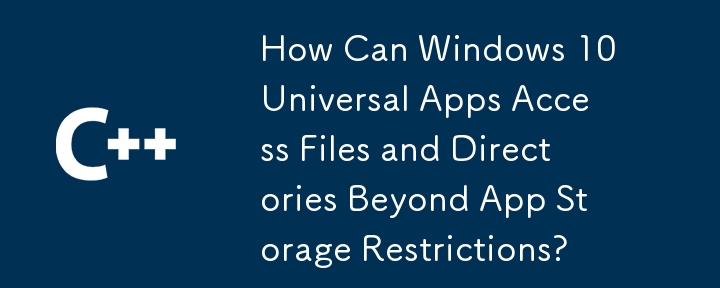 Backend Development
Backend Development
 C++
C++
 How Can Windows 10 Universal Apps Access Files and Directories Beyond App Storage Restrictions?
How Can Windows 10 Universal Apps Access Files and Directories Beyond App Storage Restrictions?
How Can Windows 10 Universal Apps Access Files and Directories Beyond App Storage Restrictions?
Jan 09, 2025 pm 10:27 PM
Windows 10 Universal App File/Directory Access
Access files and directories outside the application storage area
In Universal Windows Apps (UWP), file and directory access is limited to specific locations, including directories declared in the manifest, user-selected folders (via FileOpenPicker or FolderPicker), and files in a FutureAccessList. However, there are ways to access files outside these designated areas.
Use FolderPicker and FutureAccessList
One way is to use FolderPicker to let the user manually select the desired directory. This will grant your app access to all files and folders in that directory.
Alternatively, you can add selected directories to a FutureAccessList to make them accessible even after an app restart.
AppExecutionAlias ??and broadFileSystemAccess
In Windows 10 version 1803, additional file system access features were introduced:
- AppExecutionAlias: UWP apps that declare AppExecutionAlias ??can implicitly access files and folders in the current working directory.
- broadFileSystemAccess: This feature grants an app full file system access, similar to the user running the app. However, this feature requires a detailed justification when submitting your app to the Microsoft Store.
Note: An app must be able to handle the user's consent prompt when it requests access to a file outside of the default permissions.
The above is the detailed content of How Can Windows 10 Universal Apps Access Files and Directories Beyond App Storage Restrictions?. For more information, please follow other related articles on the PHP Chinese website!

Hot AI Tools

Undress AI Tool
Undress images for free

Undresser.AI Undress
AI-powered app for creating realistic nude photos

AI Clothes Remover
Online AI tool for removing clothes from photos.

Clothoff.io
AI clothes remover

Video Face Swap
Swap faces in any video effortlessly with our completely free AI face swap tool!

Hot Article

Hot Tools

Notepad++7.3.1
Easy-to-use and free code editor

SublimeText3 Chinese version
Chinese version, very easy to use

Zend Studio 13.0.1
Powerful PHP integrated development environment

Dreamweaver CS6
Visual web development tools

SublimeText3 Mac version
God-level code editing software (SublimeText3)

Hot Topics
 C Polymorphism : is function overloading a kind of polymorphism?
Jun 20, 2025 am 12:05 AM
C Polymorphism : is function overloading a kind of polymorphism?
Jun 20, 2025 am 12:05 AM
Yes, function overloading is a polymorphic form in C, specifically compile-time polymorphism. 1. Function overload allows multiple functions with the same name but different parameter lists. 2. The compiler decides which function to call at compile time based on the provided parameters. 3. Unlike runtime polymorphism, function overloading has no extra overhead at runtime, and is simple to implement but less flexible.
 What Are the Different Kinds of Polymorphism in C ? Explained
Jun 20, 2025 am 12:08 AM
What Are the Different Kinds of Polymorphism in C ? Explained
Jun 20, 2025 am 12:08 AM
C has two main polymorphic types: compile-time polymorphism and run-time polymorphism. 1. Compilation-time polymorphism is implemented through function overloading and templates, providing high efficiency but may lead to code bloating. 2. Runtime polymorphism is implemented through virtual functions and inheritance, providing flexibility but performance overhead.
 C : Is Polymorphism really useful?
Jun 20, 2025 am 12:01 AM
C : Is Polymorphism really useful?
Jun 20, 2025 am 12:01 AM
Yes, polymorphisms in C are very useful. 1) It provides flexibility to allow easy addition of new types; 2) promotes code reuse and reduces duplication; 3) simplifies maintenance, making the code easier to expand and adapt to changes. Despite performance and memory management challenges, its advantages are particularly significant in complex systems.
 C Destructors: Common Errors
Jun 20, 2025 am 12:12 AM
C Destructors: Common Errors
Jun 20, 2025 am 12:12 AM
C destructorscanleadtoseveralcommonerrors.Toavoidthem:1)Preventdoubledeletionbysettingpointerstonullptrorusingsmartpointers.2)Handleexceptionsindestructorsbycatchingandloggingthem.3)Usevirtualdestructorsinbaseclassesforproperpolymorphicdestruction.4
 Polymorphism in C : A Comprehensive Guide with Examples
Jun 21, 2025 am 12:11 AM
Polymorphism in C : A Comprehensive Guide with Examples
Jun 21, 2025 am 12:11 AM
Polymorphisms in C are divided into runtime polymorphisms and compile-time polymorphisms. 1. Runtime polymorphism is implemented through virtual functions, allowing the correct method to be called dynamically at runtime. 2. Compilation-time polymorphism is implemented through function overloading and templates, providing higher performance and flexibility.
 C tutorial for people who know Python
Jul 01, 2025 am 01:11 AM
C tutorial for people who know Python
Jul 01, 2025 am 01:11 AM
People who study Python transfer to C The most direct confusion is: Why can't you write like Python? Because C, although the syntax is more complex, provides underlying control capabilities and performance advantages. 1. In terms of syntax structure, C uses curly braces {} instead of indentation to organize code blocks, and variable types must be explicitly declared; 2. In terms of type system and memory management, C does not have an automatic garbage collection mechanism, and needs to manually manage memory and pay attention to releasing resources. RAII technology can assist resource management; 3. In functions and class definitions, C needs to explicitly access modifiers, constructors and destructors, and supports advanced functions such as operator overloading; 4. In terms of standard libraries, STL provides powerful containers and algorithms, but needs to adapt to generic programming ideas; 5
 What Are the Various Forms of Polymorphism in C ?
Jun 20, 2025 am 12:21 AM
What Are the Various Forms of Polymorphism in C ?
Jun 20, 2025 am 12:21 AM
C polymorphismincludescompile-time,runtime,andtemplatepolymorphism.1)Compile-timepolymorphismusesfunctionandoperatoroverloadingforefficiency.2)Runtimepolymorphismemploysvirtualfunctionsforflexibility.3)Templatepolymorphismenablesgenericprogrammingfo
 C Polymorphism: Coding Style
Jun 19, 2025 am 12:25 AM
C Polymorphism: Coding Style
Jun 19, 2025 am 12:25 AM
C polymorphismisuniqueduetoitscombinationofcompile-timeandruntimepolymorphism,allowingforbothefficiencyandflexibility.Toharnessitspowerstylishly:1)Usesmartpointerslikestd::unique_ptrformemorymanagement,2)Ensurebaseclasseshavevirtualdestructors,3)Emp





